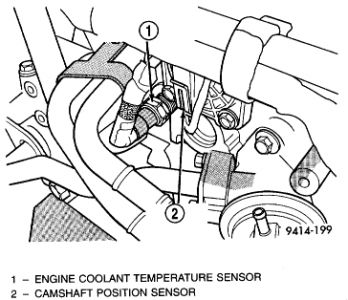Hello -
Based off the information given you have a bad engine coolant temperature sensor.

The coolant sensor threads into the rear of the cylinder head, next to the camshaft position sensor. New sensors have sealant applied to the threads.
The ECT Sensor is a Negative Thermal Coefficient (NTC ), dual range Sensor. The resistance of the ECT Sensor changes as coolant temperature changes. This results in different input voltages to the PCM. The PCM also uses the ECT Sensor input to operate the low and high speed radiator cooling fans.
The combination coolant temperature sensor has two elements. One element supplies coolant temperature signal to the PCM. The other element supplies coolant temperature signal to the instrument panel gauge cluster. The PCM determines engine coolant temperature from the coolant temperature sensor.
As coolant temperature varies the coolant temperature sensors resistance changes resulting in a different input voltage to the PCM and the instrument panel gauge cluster.
When the engine is cold, the PCM will provide slightly richer air-fuel mixtures and higher idle speeds until normal operating temperatures are reached.
The PCM has a dual temperature range program for better sensor accuracy at cold temperatures. At key-ON the PCM sends a regulated five volt signal through a 10,000 ohm resistor to the sensor. When the sensed voltage reaches approximately 1.25 volts the PCM turns on the transistor. The transistor connects a 1,000 ohm resistor in parallel with the 10,000 ohm resistor. With this drop in resistance the PCM recognizes an increase in voltage on the input circuit.
Thursday, October 30th, 2008 AT 11:44 PM
